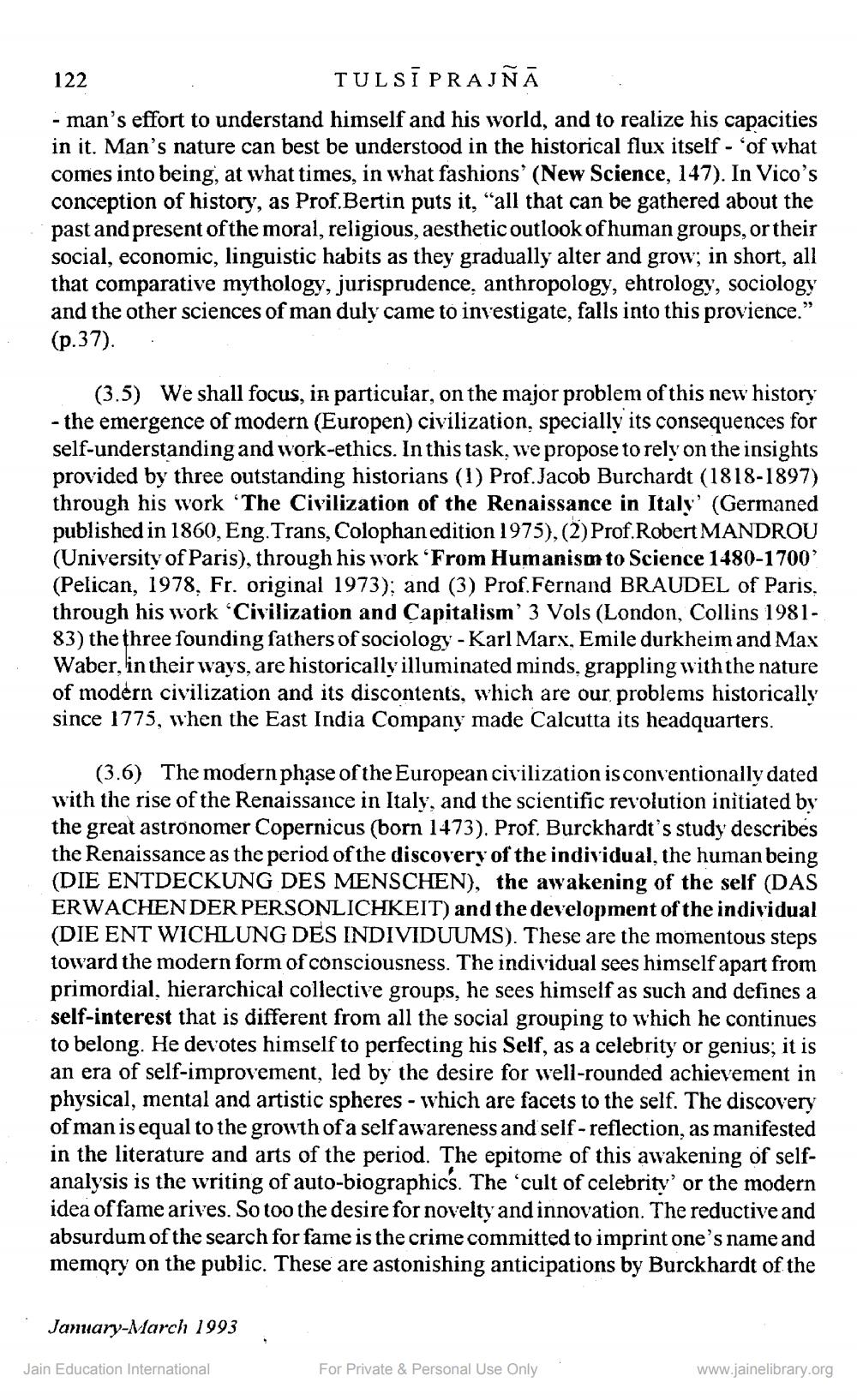________________
122
TULSI PRAJÑA
- man's effort to understand himself and his world, and to realize his capacities in it. Man's nature can best be understood in the historical flux itself - of what comes into being, at what times, in what fashions' (New Science, 147). In Vico's conception of history, as Prof.Bertin puts it, all that can be gathered about the past and present of the moral, religious, aesthetic outlook of human groups, or their social, economic, linguistic habits as they gradually alter and grow; in short, all that comparative mythology, jurisprudence, anthropology, ehtrology, sociology and the other sciences of man duly came to investigate, falls into this provience." (p.37). .
(3.5) We shall focus, in particular, on the major problem of this new history - the emergence of modern (Europen) civilization, specially its consequences for self-understanding and work-ethics. In this task, we propose to rely on the insights provided by three outstanding historians (1) Prof.Jacob Burchardt (1818-1897) through his work “The Civilization of the Renaissance in Italy' (Germaned published in 1860, Eng. Trans, Colophan edition 1975), (2)Prof. Robert MANDROU (University of Paris), through his work ‘From Humanism to Science 1480-1700 (Pelican, 1978, Fr. original 1973); and (3) Prof.Fernand BRAUDEL of Paris, through his work 'Civilization and Capitalism' 3 Vols (London, Collins 198183) the three founding fathers of sociology - Karl Marx, Emile durkheim and Max Waber, in their ways, are historically illuminated minds, grappling with the nature of modern civilization and its discontents, which are our problems historically since 1775, when the East India Company made Calcutta its headquarters
(3.6) The modern phạse of the European civilization is conventionally dated with the rise of the Renaissance in Italy, and the scientific revolution initiated by the great astronomer Copernicus (born 1473). Prof. Burckhardt's stud the Renaissance as the period of the discovery of the individual, the human being (DIE ENTDECKUNG DES MENSCHEN), the awakening of the self (DAS ERWACHENDER PERSONLICHKEIT) and the development of the individual (DIE ENT WICHLUNG DES INDIVIDUUMS). These are the momentous steps toward the modern form of consciousness. The individual sees himself apart from primordial, hierarchical collective groups, he sees himself as such and defines a self-interest that is different from all the social grouping to which he continues to belong. He devotes himself to perfecting his Self, as a celebrity or genius, it is an era of self-improvement, led by the desire for well-rounded achievement in physical, mental and artistic spheres - which are facets to the self. The discovery of man is equal to the growth of a self awareness and self-reflection, as manifested in the literature and arts of the period. The epitome of this awakening of selfanalysis is the writing of auto-biographics. The 'cult of celebrity' or the modern idea of fame arives. So too the desire for novelty and innovation. The reductive and absurdum of the search for fame is the crime committed to imprint one's name and memory on the public. These are astonishing anticipations by Burckhardt of the
January-March 1993
Jain Education International
For Private & Personal Use Only
www.jainelibrary.org




